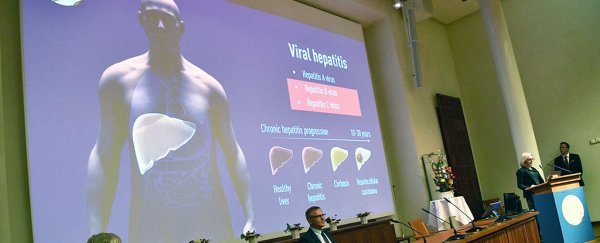Americans Harvey Alter and Charles Rice together with Briton Michael Houghton won the Nobel Medicine Prize on Monday for the discovery of the Hepatitis C virus, paving the way for a cure, the Nobel jury said.
The three were honoured for their "decisive contribution to the fight against blood-borne hepatitis, a major global health problem that causes cirrhosis and liver cancer in people around the world."
The World Health Organization estimates there are around 70 million Hepatitis C infections globally, causing around 400,000 deaths each year. It is characterized by poor appetite, vomiting, fatigue and jaundice.
Thanks to the trio's discoveries, highly sensitive blood tests for the virus are now available and these have "essentially eliminated post-transfusion hepatitis in many parts of the world, greatly improving global health", the Nobel committee said.
Their discoveries allowed the rapid development of antiviral drugs directed at Hepatitis C.
BREAKING NEWS:
— The Nobel Prize (@NobelPrize) October 5, 2020
The 2020 #NobelPrize in Physiology or Medicine has been awarded jointly to Harvey J. Alter, Michael Houghton and Charles M. Rice “for the discovery of Hepatitis C virus.” pic.twitter.com/MDHPmbiFmS
"For the first time in history, the disease can now be cured, raising hopes of eradicating Hepatitis C virus from the world population," the jury said.
Alter, 85, told the Nobel Foundation he was "in shock" after receiving early-morning calls from the committee, saying he didn't answer the first two times.
"The third time I got up angrily to answer it… and it was Stockholm," he said.
"To see so many people get cured, and nobody getting post-transfusion hepatitis, that's astounding (and) nothing I've ever thought would happen," he said.
Prior to the trio's work, the discovery of the Hepatitis A and B viruses had been critical steps forward - the discovery of Hepatitis B won the Nobel Medicine Prize in 1976 - but the majority of blood-borne hepatitis cases remained unexplained.
The discovery of Hepatitis C virus revealed the cause of the remaining cases of chronic hepatitis, and "made possible blood tests and new medicines that have saved millions of lives", the Nobel committee said.
Alter was credited for his pioneering work in the 1970s studying the occurrence of hepatitis in patients who had received blood transfusions, determining that their illness was neither Hepatitis A or B.
Houghton built on Alter's work to isolate the genetic sequence of the new virus.
Rice, 68, subsequently completed the puzzle by using genetic engineering to prove that it was the new strain alone - Hepatitis C - that was causing patients to get sick.
Rice, who works at Rockefeller University in New York, called the trio's building-block discoveries "a success story for biomedical science."
"We're seeing an amazing follow-up example of that with the pandemic. The number of groups that have stepped up to work on SARS-CoV-2, the pace at which new discoveries are being made that I hope will impact the control of the pandemic, is really staggering," he told the Nobel Foundation in an interview.
The trio will share the prize sum of 10 million Swedish kronor (about US$1.1 million, 950,000 euros).
Houghton, Alter and Rice would normally receive their prize from King Carl XVI Gustaf at a formal ceremony in Stockholm on December 10, the anniversary of the 1896 death of scientist Alfred Nobel who created the prizes in his will.
But the in-person ceremony has been cancelled this year due to the pandemic and replaced with a televised ceremony showing the laureates receiving their awards in their home countries.
Coronavirus link to prizes?
Their award comes as the hunt for a coronavirus vaccine has put the global spotlight on their field.
Both Rice and Houghton, a University of Alberta professor, are currently involved in efforts to find a vaccine for COVID-19.
Nobel medicine committee chair Patrik Ernfors said Monday's prize was "relatively easy to relate to today's situation".
"The first thing you need to do is to identify the causing virus, and once that has been done, that is the starting point for the development of drugs to treat the disease and also to develop vaccines against the disorder."
In a separate news conference, Alter emphasized that both Hepatitis C and COVID-19 could be eradicated without a vaccine, if the political will was in place.
"The kind of things that need to be done mainly is to test and treat. If we had a great rapid test for COVID and a great treatment for COVID, it would be the same, the same principle," he said.
The 2020 Nobel season continues Tuesday with the physics prize, with astrophysicists Shep Doeleman of the US and Germany's Heino Falcke seen as possible winners for work that led to the first directly observed image of a black hole in April 2019.
American mathematician Peter Shor who paved the way for today's research on quantum computers, or France's Alain Aspect for his work on quantum entanglement, have also been mentioned.
